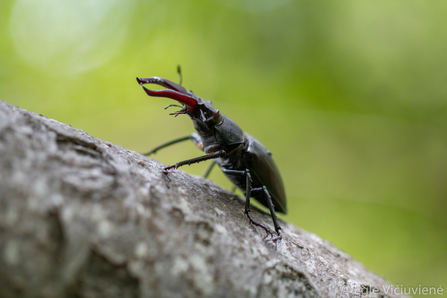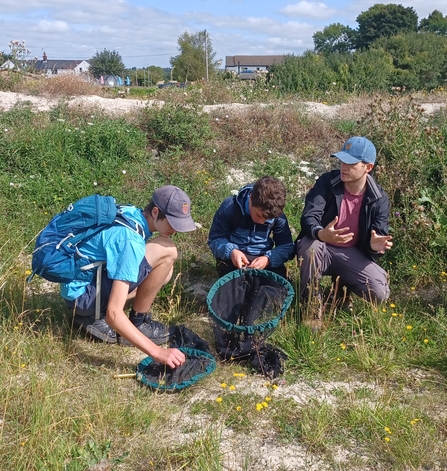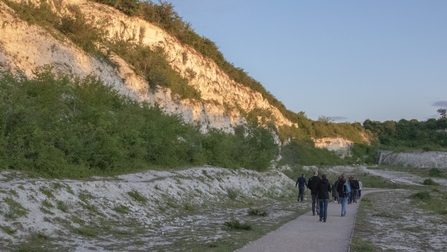Things are changing faster than anyone had predicted. Last year’s 40°C heatwave was a very tangible example, and something I had not expected to experience in my lifetime. The wildlife impacts are complex, and hard to predict. Some plant species died back or shrivelled up during the heatwave, but many of these will have survived in the soil (the ‘seed bank’, which for some plants can remain viable for decades). So, the plants can reappear after the impact. Unfortunately, insects and other animals don’t have a dormant stage like a seed bank, so they need to feed and grow, find a mate, and leave offspring, every year if they are to survive.
Working Together to Tackle the Climate Crisis

Stag beetle by Eglė Vičiuvienė
A direct effect of the heatwave was a massive crash in insect abundance in May and June this year, down around 90% on ‘normal’ years in our area. This probably reflects the species which were at their most vulnerable stages during the heatwave. Thankfully, the July-September species were reasonably abundant: but this is a different set of species, not a bounce-back for May-June insects, which may well be in short supply for several years to come.
It's easy to feel helpless in the face of the climate crisis, and seeing the Greek floods, or the fires in southern Europe, the Canary Islands and Canada. But we can do things to help. Like most of us, WTBCN is working hard to reduce our carbon footprint, switch to more sustainable suppliers and energy sources.
We are also very well aware of the carbon benefits of the habitats we create and manage. For us, it’s not mainly about tree planting, popular though that is. We prefer to enable new woodlands to develop through natural regeneration - nature knows best which species to plant where. We’ve been doing this to expand our ancient woodlands in southern Cambridgeshire since the early 2000s - take a walk through Brownes’ Piece at Waresley Wood or Sugley Wood at our Gamlingay Wood reserve, to see how flower-rich and diverse these places can be. But woodland is not the only carbon-rich habitat. In fact, peatlands (organic soil, rich in carbon and up to several metres deep) stores far more carbon per acre than woodland and can continue to add to the store indefinitely (woodland carbon plateaus after about a century). So, the Great Fen in Cambridgeshire is our biggest contribution to reducing carbon emissions, as well as creating amazing new wetlands for wildlife. We’re also trialling with paludiculture (wet farming) and our new land at Speechly’s Farm, which completes our fenland jigsaw, will provide even bigger experimental plots. Strawberry Hill is probably the largest area of natural grassland and woodland regeneration in central England, and we’re monitoring its wildlife, and its carbon storage, very carefully.

We work with a wide range of universities and research institutes to enhance our conservation and improve understanding of climate science. Banking on Butterflies is a brilliant research project with Cambridge University zoologists, exploring how to adapt chalk grassland landscapes to enable butterflies and other wildlife to cope with extreme weather. Our partnership with the Open University has looked at wet grasslands in river floodplains and has shown that these can store massive amounts of carbon in their soil - often more than woodlands hold - as well as being rich in flowers and insects, and important wintering areas for birds.
As Corporate Members, you are already contributing to our work tackling the climate crisis and we would love you to become more involved with our work. If your staff come out on work parties, you’re maintaining wildlife-rich habitats which store carbon and enable scarce species to thrive. If you want to know more about the wildlife around your own land, we can arrange lunchtime guided walks or offer advice on managing in wildlife-friendly and carbon-friendly ways. And by encouraging your staff to connect with the natural world, you can improve their well-being, in work and outside.

Thank you again for all that you do, and I look forward to meeting more of you at future Wildlife Trust corporate events.
Please contact our Corporate Partnerships team if you have any questions or would like to find out more about our activities.

